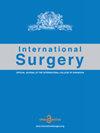禁食及给予醋酸奥曲肽和乌司他丁对胰十二指肠切除术后胰瘘临床疗效的影响
IF 0.2
4区 医学
Q4 SURGERY
引用次数: 0
摘要
目的:胰十二指肠切除术后胰瘘(POPF)是这些手术中最严重的并发症;因此,我们检查禁食的有效性,并将醋酸奥曲肽和乌司他丁作为一种预防方法。背景数据摘要:尽管已经使用了各种药物疗法和手术技术来治疗POPF,但还没有对POPF的决定性治疗方法。方法:采用重叠设计,对30例发生POPF的患者的临床病程进行回顾性评估,并在无饮食摄入(n=18)、醋酸奥曲肽(n=8)和乌司他丁(n=8。患者被分为饮食摄入组或禁食(无饮食摄入)组,无饮食摄入组的患者被进一步分为醋酸奥曲肽组或乌司他丁组。结果:无饮食摄入组的住院时间长于饮食摄入组(p=0.002)。当仅考虑B或C级POPF病例时,与饮食摄入组相比,无饮食摄入组在诊断POPF后第7天的住院时间更长,白细胞计数更高(p<0.05)。醋酸奥曲肽组的白细胞计数也高于乌司他丁组(p=0.021)结论:不进食、醋酸奥曲肽和乌司他丁似乎对胰十二指肠切除术后POPF患者的临床病程没有影响。本文章由计算机程序翻译,如有差异,请以英文原文为准。
Effects of Fasting and Administration of Octreotide Acetate and Ulinastatin on Clinical Outcomes of Pancreatic Fistula after Pancreatoduodenectomy
Objective: Postoperative pancreatic fistula (POPF) following pancreaticoduodenectomy is the most serious complication of these surgical procedures; therefore, we examine the effectiveness of fasting, and administration of octreotide acetate and ulinastatin as a method of prevention. Summary of Background Data : Although various drug therapies and surgical techniques have been used for the treatment of POPF, no decisive treatment for POPF exists. Methods: The clinical course of 30 patients who developed POPF was retrospectively evaluated and compared between no dietary intake (n=18), octreotide acetate (n=8), and ulinastatin (n=8) using an overlapping design. Patients were allocated to either the dietary intake or fasting (no dietary intake) group, and those in the no dietary intake group were further divided into the octreotide acetate or ulinastatin group. Results: Length of hospitalization was longer for the no dietary intake group than for the dietary intake group (p=0.002). When considering only grade B or C POPF cases, the no dietary intake group had a longer length of hospitalization and a higher white blood cell count on day 7 after the diagnosis of POPF than the dietary intake group (p<0.05). The white blood cell count was also higher in the octreotide acetate group than in the ulinastatin group (p=0.021). The length of hospitalization was shorter in the ulinastatin group than in the octreotide acetate group (p=0.025). Conclusions: The use of no dietary intake, octreotide acetate, and ulinastatin do not seem to contribute to the clinical course of patients with POPF after pancreatoduodenectomy.
求助全文
通过发布文献求助,成功后即可免费获取论文全文。
去求助
来源期刊

International surgery
医学-外科
CiteScore
0.30
自引率
0.00%
发文量
10
审稿时长
6-12 weeks
期刊介绍:
International Surgery is the Official Journal of the International College of Surgeons. International Surgery has been published since 1938 and has an important position in the global scientific and medical publishing field.
The Journal publishes only open access manuscripts. Advantages and benefits of open access publishing in International Surgery include:
-worldwide internet transmission
-prompt peer reviews
-timely publishing following peer review approved manuscripts
-even more timely worldwide transmissions of unedited peer review approved manuscripts (“online first”) prior to having copy edited manuscripts formally published.
Non-approved peer reviewed manuscript authors have the opportunity to update and improve manuscripts prior to again submitting for peer review.
 求助内容:
求助内容: 应助结果提醒方式:
应助结果提醒方式:


